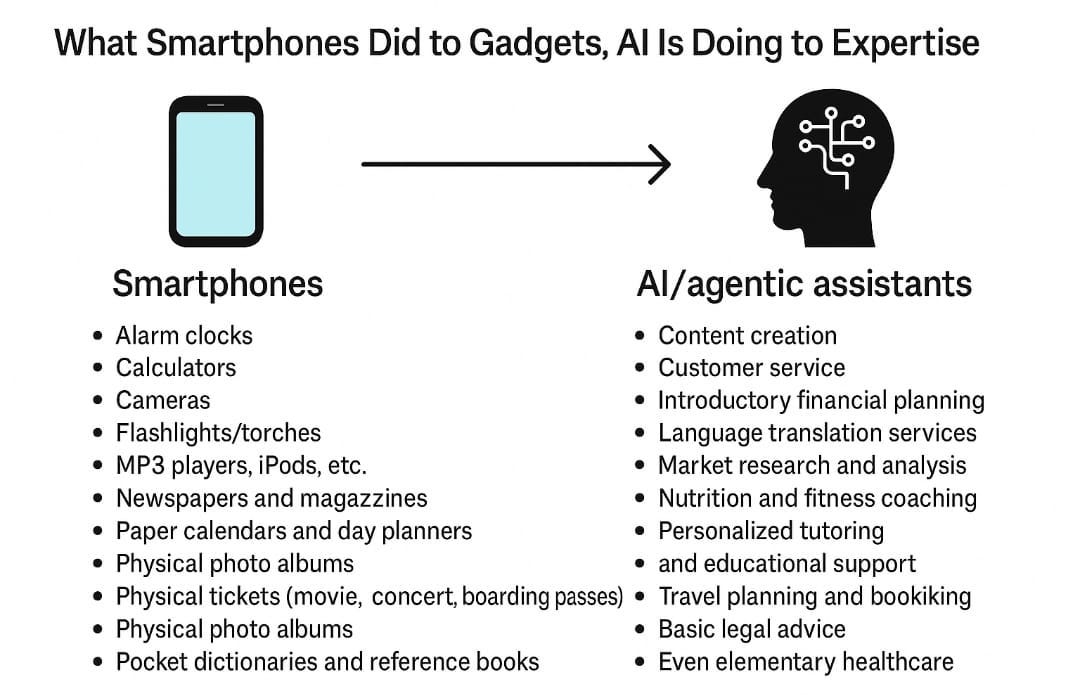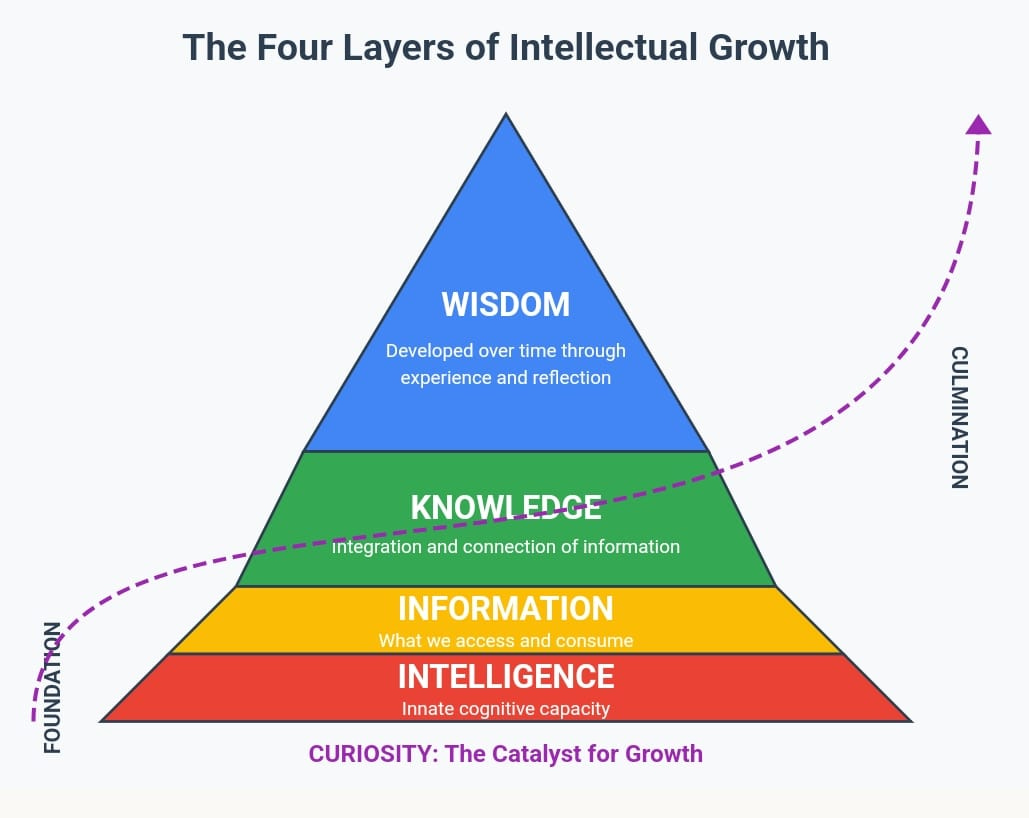Intellectual growth in the age of Machine Intelligence
As Machine Intelligence democratizes, our opportunity lies in our intellectual growth. Lean hard on staying "curious", exercising "agency" and developing "judgement".
AI is doing to white-collar work what smartphones did to gadgets.
Just as smartphones absorbed cameras, calculators, alarm clocks, torches, and a dozen other single-function tools into a sleek slab of glass, AI is now absorbing entire categories of knowledge services and intellectual labour. Not just augmenting, but quietly collapsing them.
This is NOT merely a technological shift. It’s a deep restructuring of what we value, how we learn, how we apply intelligence, and, frankly, how we survive professionally in the years to come.
The Absorption Pattern Repeats
When smartphones emerged, we didn’t stop needing light or music or maps. We just stopped needing torches, MP3 players, or paper atlases. The hardware shrank, the UX changed, and the value migrated. That shift didn’t take 50 years. It took about 10–15.
Now the same pattern is playing out with what I call as ‘knowledge broking economy’. Only this time, the devices being absorbed aren’t physical. They’re human roles.
AI assistants powered by LLMs are now absorbing categories of cognitive work. From language translation and tutoring to resume writing and financial support. We’re watching AI systems handle content creation, customer service, basic legal help or even elementary health recommendations and assessments.
This is the collapse of the knowledge-broking economy.
Just like calculators made basic arithmetic a commodity, LLMs are making “being good at summarizing or researching things online” a commodity. Fast.
A Shift from Intelligence to Intellect
This isn’t just about new tools. It’s about a new map of how human cognitive advantage evolves and where we go next.
I am viewing it as a 4-layer stack. Not because it’s perfect, but because it helps me (and maybe others) frame what's happening, and what's worth doubling down on.
The Four Layers of Intellectual Growth: Intelligence is no longer a differentiator. Curiosity, Agency and Judgement augment our human potential.
Yes, the inspiration is from Maslow’s hierarchy of needs.
Intelligence (The Foundation)
Our raw cognitive capacity - memory, IQ, computation speed. Intelligence is our starting point - largely innate, what we're born with. Our cognitive capacity that varies from person to person.
This foundation isn't something we can drastically change, and that's perfectly fine. It's simply our starting point, neither good nor bad in itself. But now, machines exceed us in pattern recognition, recall, and reasoning speed in most domains.
The fascinating shift happening now is that intelligence, once the primary differentiator in many professional contexts, is becoming increasingly commoditized through AI. The professional advantage of simply being "smart" is diminishing rapidly.
If you have more raw intelligence than I do, you will certainly have an advantage at the starting line. But that advantage may no longer last if you don't cultivate the three skills we're discussing.
This is where information access, asymmetry, and arbitrage start to play their role.
Information (Access + Agency)
This second layer of human intellectual growth requires being informed. Unlike intelligence, the information we access and consume is substantially within our control - this is where agency matters.
In today's digital age, we have unprecedented access to information from countless sources. But AI is quickly surpassing us in navigating and filtering huge info sets.
Information without integration is just noise. Someone reading multiple news outlets daily is operating at this level, accumulating data points but not necessarily connecting them in meaningful ways. What information you consume, how you process it, and what you do with it determines how you differentiate yourself beyond your raw intelligence.
When you combine curiosity with the right agency in information access and accumulation, you have the opportunity to convert that into real knowledge.
Knowledge (Synthesis)
This is where meaning-making begins. Connecting dots, interpreting ambiguity, seeing what's not obvious.
AI is inching into this layer. Synthesizing better every day. But, it still lacks grounded judgement, ethics, and context.
Knowledge emerges when we begin to organize, analyse, and integrate information meaningfully. It's about connecting dots between disparate pieces of information to form cohesive understanding even when there is no existing pattern or precedence.
This is where being "smart" versus being "clever" begins to differentiate. A smart person might memorize many facts, but a clever person connects those facts to identify patterns and solve problems that weren't obvious from the individual pieces.
The deep knowledge you build by connecting dots is where you start to differentiate significantly from machines.
But knowledge accumulation alone will eventually not be enough. Knowledge isn't constant, and theoretical knowledge doesn't always work as-is in the real world.
You need to experiment, experience, reflect, learn, iterate, and translate that knowledge into wisdom.
Wisdom (Judgement + Time)
The uniquely human layer. The one you earn over years or sometimes in merely seconds.
It knows not only what works, but when and why. It integrates experience, ethics, and emotion. This is the layer where human advantage still holds - at least for now.
Judgment is something you sharpen over time. You develop it by being in the weeds. Battle scars aren't just memories but deep lessons you only learn on the field.
The wise person knows not only what to do but when to do it - and sometimes, when not to act at all. Wisdom involves judgment, context, ethics, and the balancing of competing values in complex situations.
Wisdom represents the highest layer of intellectual development. It comes from the slow digestion of knowledge over time, allowing us to evolve to a more complete version of ourselves.
Curiosity, Agency & Judgement — The Human Competency Stack
So if raw intelligence isn’t enough, and access to information isn’t scarce, what do we build on?
I keep coming back to three levers that feel enduring, human, and highly leverageable in an AI-powered world:
Curiosity: The urge to explore, challenge, ask “what if?”
Agency: The ability to act on information, not just consume it
Judgement: The learned ability to weigh context, consequence, and timing
These aren't technical skills. They’re meta-skills. But they’re what elevate us as thinkers, doers, leaders. This is our chance to grow exponentially with pervasive machine intelligence when intelligent systems are everywhere.
Time: The Invisible Layer
One thing AI still doesn’t understand is time. Not just chronology, but maturity.
It can recall what you said 15 seconds ago.
But it doesn’t really understand what happened across five years of a messy product rollout, or why a senior exec chose to wait instead of react.
This time gap is what distinguishes intelligence from wisdom.
Intelligence operates in seconds and the short term. Knowledge develops over the medium term. Wisdom emerges over the long run and may never plateau.
This isn’t nostalgia. It’s strategic. If you’ve been in rooms where decisions are made not by the smartest person, but the calmest or most experienced one, you already understand this.
What This Means in Practice
Whether you’re leading a team, designing software, running a company, or navigating your own role, here’s what I’m seeing:
The business model of brokering knowledge is collapsing.
If your value lies in researching, summarizing, or relaying existing knowledge. AI will undercut you fast and cheap.The expertise premium is shifting from synthesis to application.
It’s not what you know. It’s how you apply, translate, and adapt what you know. Especially under pressure.Judgement is the new scarcity.
In a world where anyone can access “smart” answers, being able to discern good from bad, timely from premature, that’s the new delta.
Learning and Unlearning
This is not a doom narrative. But it is a change management one, starting with yourself.
You’ll need to learn faster.
But more importantly, you’ll need to unlearn faster.
What helped you stand out 5 years ago might be precisely what holds you back now.
We're entering a world where machine intelligence is no longer a novelty. It's infrastructure.
Human advantage will be measured in depth and width, not speed.
Final Thought
What do we do with all this?
We stop trying to outrun machines. Work with machines. Bringing on board what we are unique at:
Carry contradictions.
Sit with uncertainty.
Exercise judgement.
Apply wisdom.
The future isn’t about beating AI. It’s about being the best at what machines are missing and lead those machines as we co-evolve in the age of machine intelligence.
For now, that means leaning hard into curiosity, agency, and wisdom - The very things that have always made humans a little more than intelligent.






Excellent post, very relatable.
Last year I wrote a 3-part series on what I called "Roboconsultants", which has a lot of overlap with your working theory, just applied to the world of management consulting.
I thought you could be interested in that!
"This time gap is what distinguishes intelligence from wisdom."
I love this idea